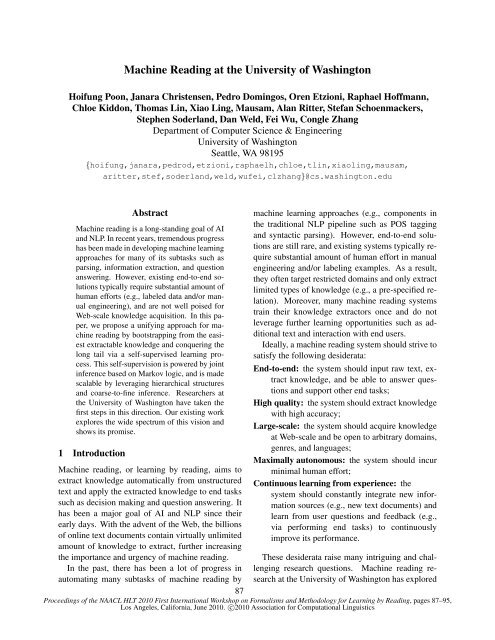W10-09
W10-09
W10-09
You also want an ePaper? Increase the reach of your titles
YUMPU automatically turns print PDFs into web optimized ePapers that Google loves.
Machine Reading at the University of Washington<br />
Hoifung Poon, Janara Christensen, Pedro Domingos, Oren Etzioni, Raphael Hoffmann,<br />
Chloe Kiddon, Thomas Lin, Xiao Ling, Mausam, Alan Ritter, Stefan Schoenmackers,<br />
Stephen Soderland, Dan Weld, Fei Wu, Congle Zhang<br />
Department of Computer Science & Engineering<br />
University of Washington<br />
Seattle, WA 98195<br />
{hoifung,janara,pedrod,etzioni,raphaelh,chloe,tlin,xiaoling,mausam,<br />
aritter,stef,soderland,weld,wufei,clzhang}@cs.washington.edu<br />
Abstract<br />
Machine reading is a long-standing goal of AI<br />
and NLP. In recent years, tremendous progress<br />
has been made in developing machine learning<br />
approaches for many of its subtasks such as<br />
parsing, information extraction, and question<br />
answering. However, existing end-to-end solutions<br />
typically require substantial amount of<br />
human efforts (e.g., labeled data and/or manual<br />
engineering), and are not well poised for<br />
Web-scale knowledge acquisition. In this paper,<br />
we propose a unifying approach for machine<br />
reading by bootstrapping from the easiest<br />
extractable knowledge and conquering the<br />
long tail via a self-supervised learning process.<br />
This self-supervision is powered by joint<br />
inference based on Markov logic, and is made<br />
scalable by leveraging hierarchical structures<br />
and coarse-to-fine inference. Researchers at<br />
the University of Washington have taken the<br />
first steps in this direction. Our existing work<br />
explores the wide spectrum of this vision and<br />
shows its promise.<br />
1 Introduction<br />
Machine reading, or learning by reading, aims to<br />
extract knowledge automatically from unstructured<br />
text and apply the extracted knowledge to end tasks<br />
such as decision making and question answering. It<br />
has been a major goal of AI and NLP since their<br />
early days. With the advent of the Web, the billions<br />
of online text documents contain virtually unlimited<br />
amount of knowledge to extract, further increasing<br />
the importance and urgency of machine reading.<br />
In the past, there has been a lot of progress in<br />
automating many subtasks of machine reading by<br />
machine learning approaches (e.g., components in<br />
the traditional NLP pipeline such as POS tagging<br />
and syntactic parsing). However, end-to-end solutions<br />
are still rare, and existing systems typically require<br />
substantial amount of human effort in manual<br />
engineering and/or labeling examples. As a result,<br />
they often target restricted domains and only extract<br />
limited types of knowledge (e.g., a pre-specified relation).<br />
Moreover, many machine reading systems<br />
train their knowledge extractors once and do not<br />
leverage further learning opportunities such as additional<br />
text and interaction with end users.<br />
Ideally, a machine reading system should strive to<br />
satisfy the following desiderata:<br />
End-to-end: the system should input raw text, extract<br />
knowledge, and be able to answer questions<br />
and support other end tasks;<br />
High quality: the system should extract knowledge<br />
with high accuracy;<br />
Large-scale: the system should acquire knowledge<br />
at Web-scale and be open to arbitrary domains,<br />
genres, and languages;<br />
Maximally autonomous: the system should incur<br />
minimal human effort;<br />
Continuous learning from experience: the<br />
system should constantly integrate new information<br />
sources (e.g., new text documents) and<br />
learn from user questions and feedback (e.g.,<br />
via performing end tasks) to continuously<br />
improve its performance.<br />
These desiderata raise many intriguing and challenging<br />
research questions. Machine reading research<br />
at the University of Washington has explored<br />
87<br />
Proceedings of the NAACL HLT 2010 First International Workshop on Formalisms and Methodology for Learning by Reading, pages 87–95,<br />
Los Angeles, California, June 2010. c○2010 Association for Computational Linguistics


